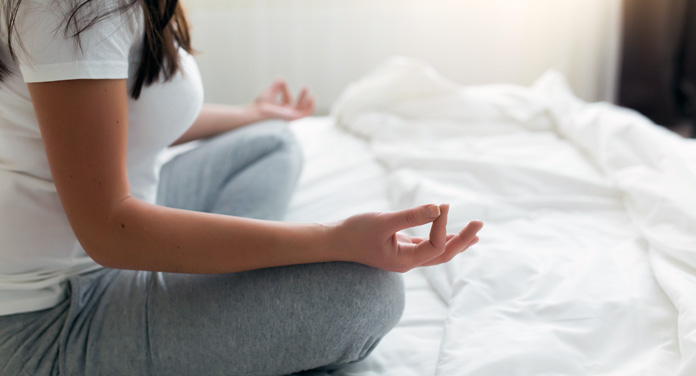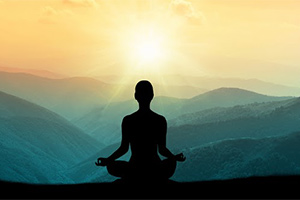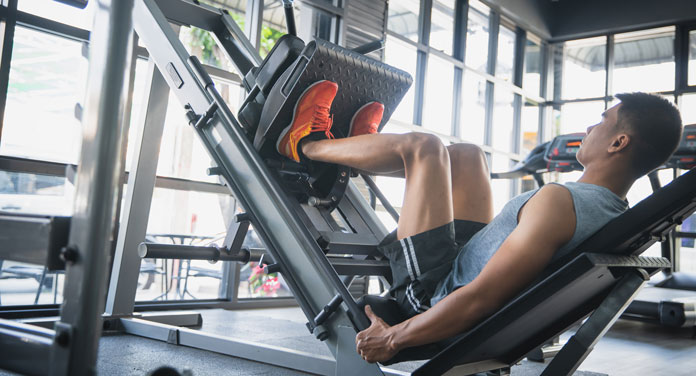Problems falling asleep can be traced back to many causes. One of the most common reasons for insomnia is ruminating on everyday challenges or worries. You may be under a lot of pressure at work and therefore find it difficult to rest at night. Or you ponder your relationship or family. However, external causes may also be decisive, e.g. a restless sleeping environment or the wrong mattress.
Whatever is keeping you from sleeping, one thing is for sure: poor sleep quality affects your physical and mental performance during the day. However, lying awake and brooding at night has never found a constructive solution to a problem. But on the contrary. In order to overcome your everyday challenges, you must gather strength at night. It is therefore important to find a method that makes it easier for you to fall asleep. How about, for example, meditation to fall asleep?
What Is Meditation?
The term “meditation” comes from Latin. It derives from the Latin word “meditatio”, which means something like “thinking about” and from “medio”, which translates as “the middle”. Meditation denotes a spiritual practice. With the help of various concentration exercises, a state of deepest relaxation and inner contemplation can be achieved. If you meditate regularly, you can be completely in tune with yourself. This allows you to free yourself from your mental stress for a while and recharge your batteries so that you can face everyday life and all its challenges with new energy.
Psychosomatic complaints, including sleep disorders, can also be effectively treated with meditation. There are different ways to meditate. So-called accompanied meditations are particularly suitable for beginners. Advanced users can let themselves slide into a state of relaxation. Experiment with what you feel most comfortable with.
How Can Meditation Help You Fall Asleep?
As explained earlier, meditation induces a state of deepest relaxation. Stress and worries fade into the background. The most common reason why people don’t fall asleep at night is excessive rumination. Through meditation, you stop your negative thought carousel.
If you meditate before falling asleep, your blood pressure will drop and your heartbeat will slow down. Your body and mind will rest, making it easier for you to fall asleep. Incidentally, the effectiveness of meditation as a sleep aid has been scientifically confirmed in several independent studies.
What Types Of Meditation Are There And Which One Is Right For You?
Meditation is not just meditation. There are a variety of possible relaxation practices, but they all have the same goal. Which method you choose is up to your personal preferences. We recommend that you try a guided meditation, to begin with. You can find various meditation audiobooks on the market that you can listen to while you fall asleep.
You can also find numerous offers on the Internet, for example on YouTube, some of which are even free of charge. In a guided meditation, a gentle voice, often accompanied by calm music, sends you on a dream journey. You are encouraged to feel deep into your body and relax it.
Alternatively, you can try a classic sitting meditation. A well-known variant is the so-called mindfulness meditation. Here you concentrate on the perception of your thoughts and feelings.
You let your thoughts flow and accept all emotions as they are. In this way, you learn to reflect on the moment and perceive your needs. Only when you know your needs can you take care of your well-being. This will not only make you feel better overall, but it will also make it easier for you to fall asleep.
Another method is silent meditation. In contrast to mindfulness meditation, an attempt is made to block out all thoughts. The desired “emptiness” makes it easier for the body and mind to relax. Which of the two approaches works better varies from person to person.
What Should You Consider Before Meditating?
In order for the meditation to have its full effect, you should optimally adjust the environmental conditions. The most important thing you need to meditate on is stillness. For this reason, you should ban all electronic devices from your bedroom. Avoid watching TV or using your smartphone late in the evening. All the hectic, bright images upset you too much, making it unnecessarily difficult to fall asleep.
Your bedroom should be well ventilated and at a comfortable temperature. If you like, you can also spray a relaxing room fragrance (e.g. lavender) after airing the room in the evening. Make sure your bedroom is well darkened. Your body only releases the sleep hormone melatonin when it is dark.
For meditation, you can illuminate the room with soft lights (such as fairy lights or salt lamps). In addition, you should generally pay attention to optimal sleep hygiene. This includes eating your evening meal at least three hours before you go to bed, avoiding caffeine in the late afternoon, and making sure that your sleeping pattern is as constant as possible – even at the weekend or on vacation.
With headaches, it is important to keep your head straight and in line with your neck and spine. To do this, lie on your back and place pillows around your head to prevent you from moving it too much while you sleep.
Practical Tips For Meditation – Simple Exercises To Fall Asleep
Breathing plays an important role in meditation – regardless of which form of meditation you choose. Try to consciously focus on the flow of your breath. Feel how your nostrils move and follow the flow of breath into your stomach. Place your hands on your abdomen and feel your core gently rise and fall. Count slowly to ten. When you get there, start counting again. The monotony relaxes your mind and body. You probably won’t get through three sets before you fall asleep.
If it helps, imagine sheep or clouds as you count. In addition to calm breathing, the relaxation of the entire body is of great importance in meditation. While you breathe deeply in and out, you should perform a so-called body scan. As you do this, you mentally wander into every muscle in your body, from your fingertips to your little toe. Feel into every part of the body to discover unconscious cramps and relax again. Due to this intensive concentration on body and breath, musings no longer stand a chance.






